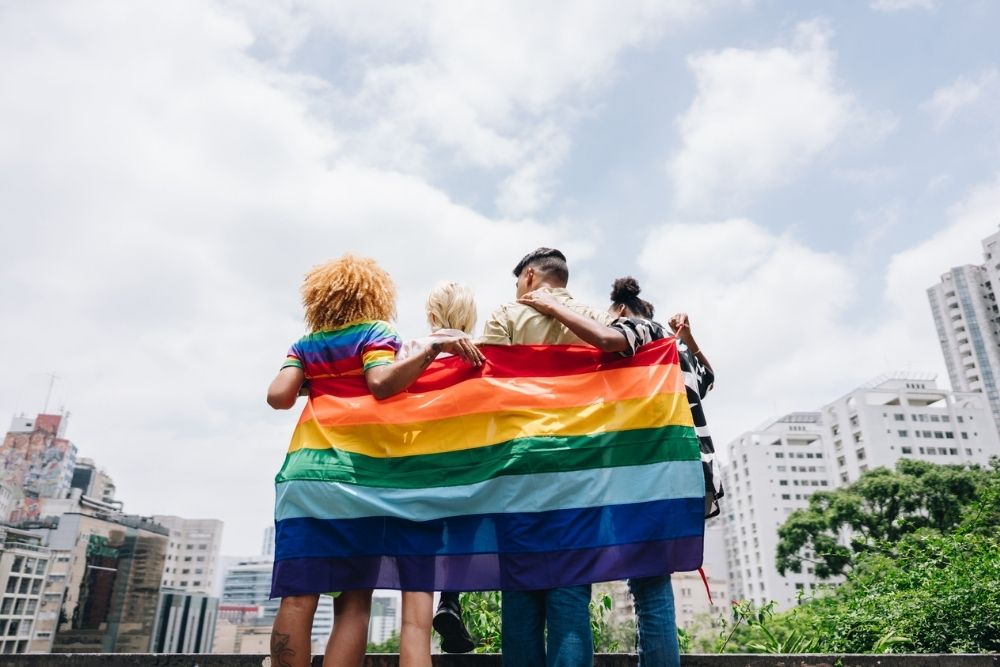Mental and emotional well-being are fundamental aspects of overall health, yet for many members of the LGBTQIA2s+ community (which we’ll collectively refer to in this article as LGBTQ+), there are considerable challenges regarding health equity and support.
June, recognized as Pride Month, serves as a powerful reminder of the importance of visibility, acceptance, and celebration of LGBTQ+ identities. Originating from the 1969 Stonewall Uprising, Pride Month commemorates the resilience and progress of the LGBTQ+ community in the face of adversity. It’s also the perfect time to rally together to celebrate recovery from substance use disorder (SUD) and alcohol use disorder (AUD) and share tips on how to better manage mental and emotional health.
Concerns About LGBTQ+ Health
Research from the American Psychiatric Association indicates that LGBTQ+ individuals are more than twice as likely as their heterosexual counterparts to experience mental health disorders, including depression, anxiety, and SUD and AUD.
Additionally, an Iowa survey indicated that 67% of LGBTQ+ teens “said they experienced persistent sadness or hopelessness almost every day for two weeks or more in a row, which stopped them from doing some usual activities. That compares to the 24% of youth who identify as straight who responded similarly about experiencing persistent sadness or hopelessness.” Even more critical? “55% of LGBTQ+ youth said they’d had suicidal thoughts.”
It’s also crucial to note that a significant number of LGBTQ+ individuals report being denied needed health care, especially people who identify as transgender. This lack of access to affirming care exacerbates existing mental health issues and underscores the need for inclusive and culturally competent health services.
The intersectionality within the LGBTQ+ community also plays a role. Individuals who identify as LGBTQ+ and belong to other marginalized groups—such as people of color or those with disabilities—often face compounded challenges that can further strain mental and emotional health.
These disparities are often attributed to “minority stress”—a term that encompasses the chronic stress faced by people who belong to stigmatized social categories. This stress arises from experiences such as discrimination, rejection, and societal pressures, which profoundly impact mental health.
Why Pride Matters for LGBTQ+ Health
Pride Month highlights the importance of representation and visibility. Seeing diverse LGBTQ+ individuals openly celebrating their identities is empowering and affirming, boosting self-esteem and validating personal experiences. This increased visibility allows for greater societal acceptance, which is crucial for reducing stigma and discrimination that negatively impact mental health.
Additionally, Pride events provide access to resources and support systems, connecting individuals with mental health services and community groups that offer assistance and solidarity. Here are just a few.
Established in 1996, this agency offers a hotline as well as “access to over 19,000 LGBTQ+ community resources throughout the United States and Canada.”
National Alliance on Mental Illness
This organization focuses on numerous topics important to the LGBTQ+ community, such as how to find an inclusive healthcare provider, different resources that help with specific circumstances, and how to join the #IAmNAMIPride movement.
The mission of this nonprofit “advances, empowers, and improves the lives of LGBTQ+ Iowans statewide.” It offers a comprehensive list of healthcare providers and other agencies.
The Gay and Lesbian Medical Association
This is “the world’s oldest and largest association of lesbian, gay, bisexual, transgender, and queer and allied health professionals.” You can find providers, participate in research, and seek out other resources.
This is “the leading suicide prevention and crisis intervention organization for LGBTQ+ young people.” It offers a welcoming online community for people aged 13–24 and other vital resources.
Find the Support You Deserve at Ivory Plains
Prioritizing LGBTQ+ mental and emotional health isn’t just a matter of addressing disparities but also of celebrating the richness and diversity of the community. Pride Month serves as a reminder of the importance of visibility, acceptance, and support in fostering mental well-being. By continuing to advocate for culturally sensitive practices, providing access to affirming care, and celebrating identities, we can work towards a future where all people thrive mentally and emotionally.
At our inclusive residential rehabilitation program in Adair, Iowa, we have board-certified professionals who focus on whole-person health. We acknowledge collective challenges but also strive to honor individual dignity, considering all aspects of life and providing customized solutions for mind, body, and spirit wellness. Talk to a member of our admissions team today to learn how we can help you.
If you or someone you know is in distress or requires prevention or crisis resources, contact the 988 Lifeline for free, confidential support 24 hours a day, 7 days a week. Simply dial 988 from any phone or start an online chat.





